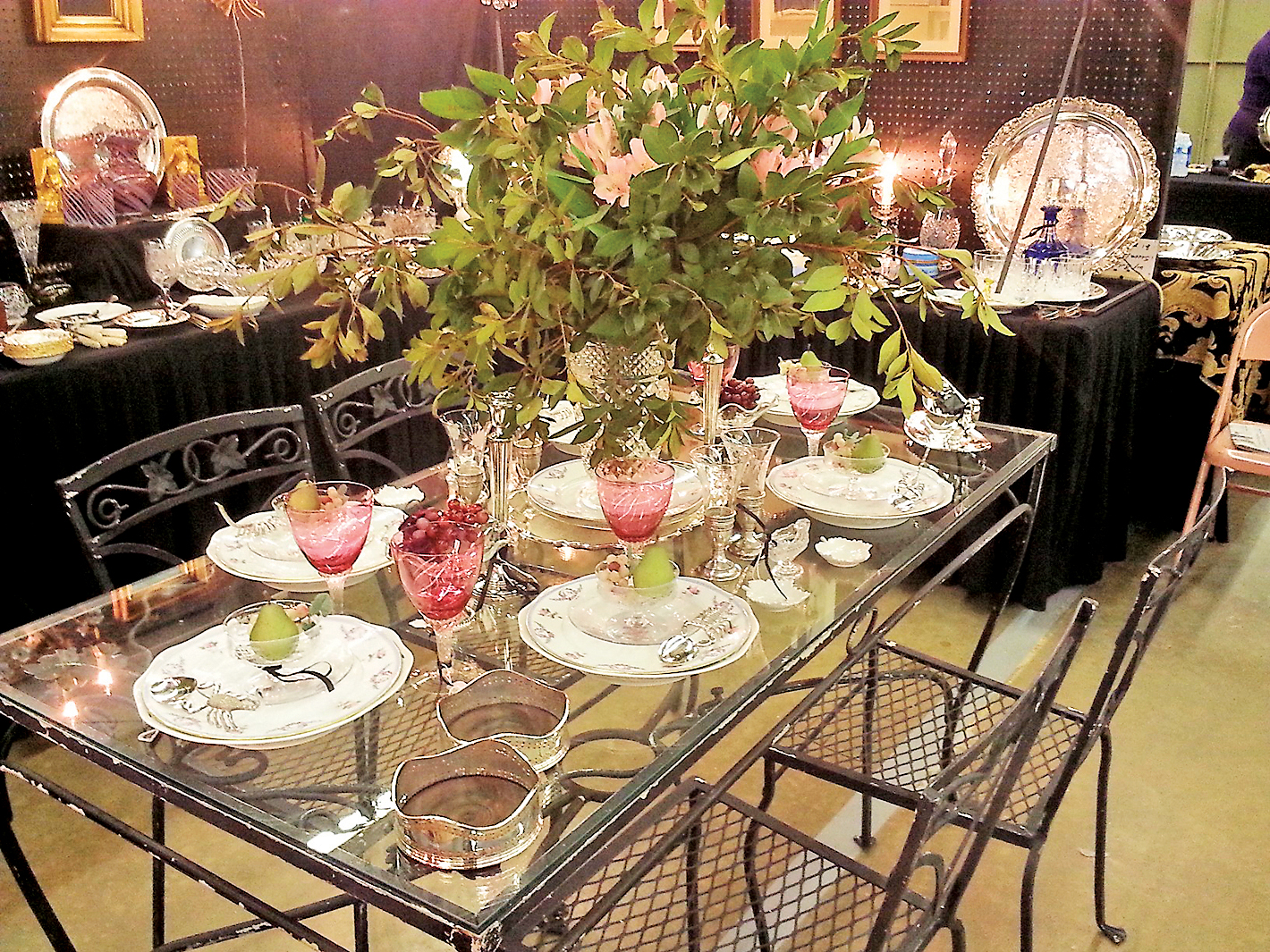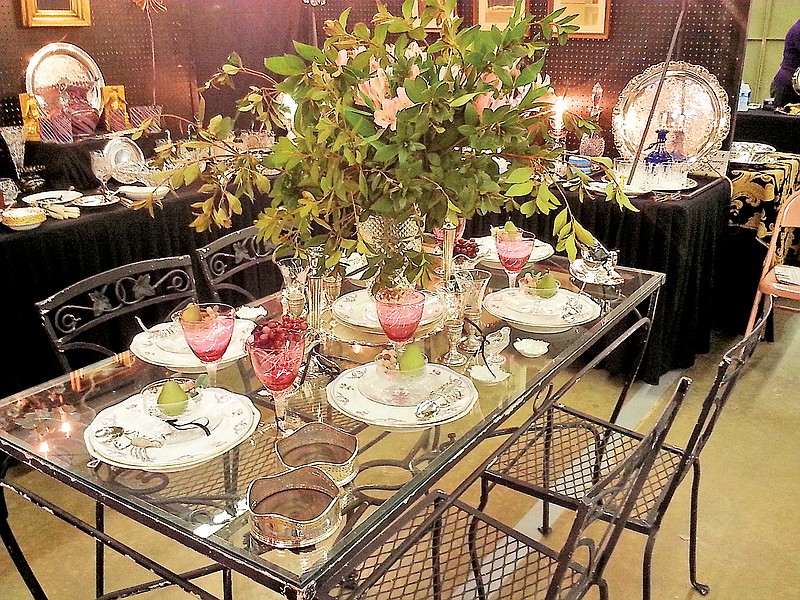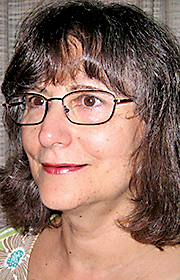 It used to be common practice for brides to select everyday and "good" patterns in china, glass and silver for their brid- al registries. Table settings, such as the one above, were expected for entertaining. But as bridal styles have become more casual, so has entertaining and name brands in glassware show up less often and are purchased less frequently as gifts, says Gay LeClaire Taylor. The nationally known glass expert will be speaking at the Houston Museum Antiques Show and Sale, which runs Feb. 27 though March 1.
It used to be common practice for brides to select everyday and "good" patterns in china, glass and silver for their brid- al registries. Table settings, such as the one above, were expected for entertaining. But as bridal styles have become more casual, so has entertaining and name brands in glassware show up less often and are purchased less frequently as gifts, says Gay LeClaire Taylor. The nationally known glass expert will be speaking at the Houston Museum Antiques Show and Sale, which runs Feb. 27 though March 1.If You Go
* What: Houston Museum Antiques Show & Sale. * Where: Stratton Hall, 3146 Broad St. * When: 10 a.m.-5 p.m. Friday-Saturday, Feb. 27-28; noon-4 p.m. Sunday, March 1. * Admission: $10. * For more information: 423-267-7176. Speaker's Schedule * Friday, Feb. 27: Glass identification, limit of three items per person. 10 a.m.-1 p.m. * Saturday, Feb. 28: "Glass Threads," 1 p.m., followed by glass identification from 2-4 p.m., limit of three items per person. * Sunday, March 1: "American Paperweights," 1 p.m.
Gay LeClaire Taylor believes it's more than coincidence she was booked to speak at the Houston Museum's Antiques Show and Sale. Her appearance brings her family history full circle.
"My mother's father was born in Damascus, Syria. He came to America in 1889 and lived in Chattanooga, working in a foundry from 1890 to 1892," she explains. "He eventually moved to Philadelphia and became a dentist. He wrote a whole chapter in his memoirs about Chattanooga, and how he wanted to return one day to pick violets on Lookout Mountain, where they had picnics."
Taylor is a former director/curator of the Museum of American Glass at Wheaton Arts and Cultural Center in Millville, N.J., and a nationally renowned lecturer. Since retiring, the New Jersey resident has become an independent consultant on glass. She will give educational talks during the Houston Show as well as offer glass identification on pieces brought in by show visitors.
Taylor answered questions on how researching her favorite glass company, Durand, led to the creation of her "Glass Threads" talk and her concerns for the future of glass collecting.
Q: What are 'Glass Threads'?
A: Durand glass was founded in New Jersey. The compny only lasted seven years. It traces its roots to Tiffany's. I begin my talk with how Louis Comfort Tiffany started, how a worker for him leaves and starts his own company, then that worker's son ends up at Durand. Those are threads that pulled together to create Durand.
We have five handwritten letters about how this group got together that tell where they were before. That kind of history in glass today is being lost to email. One of the letters is a handwritten note about what train to take -- that paper got saved, so historians know what date they had to be at the factory. If that had been an email, it would have been deleted. We are removing our history with this age of emails."
Q: Are there other ways in which technology affects glass collectors?
Technology has really changed how people buy (eBay) and even learn about things. The publishing of research books on glass is down because people search for information on the Internet.
Q: Less than a decade ago, brides-to-be chose patterns for daily and "good-use" glass. This is no longer the case. As consumers buy less glass, is it possible we could see the medium become obsolete?
I think the whole style of brides is so casual now. That whole entertaining and having a good set of china and silver -- we don't do those things anymore. Plastic has made such inroads into glass it's hard to go back. One time I did a talk where I took things out of my refrigerator (ketchup, mayo, milk) and took a photograph of the group. They were all in plastic, where previously they would have been in glass containers. People use plastic to drink from as well.
Presidents used to give gifts of glass to visiting heads of state. Steuben glass was the choice of presidents from Harry Truman to Ronald Reagan. When President Obama went to visit the Queen of England, he gave electronics (an iPod).
The only thing that is the shining light in glass is that it now has become an artistic medium. Glass artists are using glass to make sculpture, as an art medium instead of utilitarian. In my lifetime I'm seeing shops close because things aren't selling. It's all in the changing tastes of people.
Q: Is cranberry glass, Depression glass or sandwich glass still popular with collectors?
People still collect cranberry glass and Depression glass. Those haven't gotten to such a high price range that people can't afford them. Pricing depends on the amount of production of a piece; that allows for its rarity. The rarer the piece, the higher the price.
We get romantic about glass and think these pieces should have continued to be made. But glass is a business; if something didn't sell, manufacturers went on to the next thing.
Q: Are glass prices up or down now?
Unfortunately after 2008, there was a downturn on collecting historic glasses. But prices of contemporary glass -- the studio glass modern artists are making -- are still pretty high.
Q: Your advice to collectors?
Don't buy a piece for an investment, buy because you like it. The No. 1 rule is that you should really like what you are collecting.
Contact Susan Pierce at spierce@timesfreepress.com or 423-757-6284.

